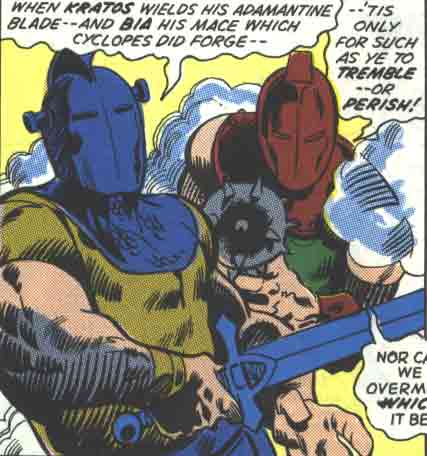August 21, 2005
your craft is not to blame for what must be inflicted now

Why is the Met's disastrous shoot-to-kill policy called Operation Kratos?
Look no further than the comments box for this post on Lenin's Tomb, where Savonarola finds the answer in Aeschylus. The following passage from Prometheus Bound does indeed provides an insight into 'the mythological unconscious of the State'.
A rocky mountain-top, within sight of the sea. Enter Kratos and Bia, dragging in Prometheos. Hephaistos follows.
Kratos: Here we have reached the remotest region of the earth, the haunt of Skythians, a wilderness without footprint. Hephaistos, do your duty. Remember what command the Father laid on you. Here is Prometheos, the rebel: nail him to the rock; secure him on this towering summit fast in the unyielding grip of adamantine chains. It was your treasure that he stole, the flowery splendour of all-fashioning fire, and gave to men - an offence intolerable to the gods, for which he now must suffer, till he be taught to accept the sovereignty of Zeus and cease acting as champion of the human race.
Hephaistos: For you two, Kratos and Bia, the command of Zeus is now performed. You are released. But how can I find heart to lay hands on a god of my own race and cruelly clamp him to this bitter, bleak ravine? Ö
Kratos: What is the use of wasting time in pity? Why do you not hate a god who is an enemy to all the gods who gave away to humankind your privilege?
Hephaistos: The ties of birth and comradeship are strangely strong.
Kratos: True, yet how is it possible to disobey the Fatherís word? Is not that something you dread more?
Hephaistos: You have been always cruel, full of aggressiveness.
Kratos: It does no good to break your heart for him. Come now, you cannot help him: waste no time in worrying.
Hephaistos: I hate my craft, I hate the skill of my own hands.
Kratos: Why do you hate it? Take the simple view: your craft is not to blame for what must be inflicted now.
Hephaistos: True - yet I wish some other had been given my skill.
Kratos: All tasks are burdensome - except to rule the gods, no one is free but Zeus.
Hephaistos: I know. All this (indicating Prometheus) is proof beyond dispute.
Kratos: Be quick then; put the fetters on him before the Father sees you idling.
Hephaistos: Here, then, look! The iron wrist bands are ready (he begins to fix them).
Kratos: Take them; manacle him; hammer with all your force, rivet him to the rock.
Hephaistos: All right, Iím doing it! There, that iron will not come loose.
Kratos: Drive it in further; clamp him fast, leave nothing slack.
Hephaistos: This arm is firm; at least heíll find no way out there.
Kratos: Now nail his other arm securely. Let him learn that all his wisdom is but folly before Zeus.
Hephaistos: There! None - but he - could fairly find fault with my work.
Kratos: Now drive straight through his chest with all the force you have the unrelenting fang of the adamantine wedge.
Gravatar Hephaistos: Alas! I weep, Prometheos, for your sufferings.
Kratos: Still shrinking? Weeping for the enemy of Zeus? Take care; or you may need your pity for yourself.
(Hephaistos drives in the wedge)

Meanwhile, Michael Portillo shames the pitiful efforts of the so-called liberal left by proving that being a columnist on a British broadsheet does not necessarily require brain death, with a typically cogent assault on the 'mess at the Met':
'For days after the killing it was reported that de Menezes was running, and that he had vaulted the ticket barrier into Stockwell station. Some of that misunderstanding may have arisen innocently, if for example a witness saw a man leaping the barrier without realising that he was in fact a police officer in plain clothes. But the police did not correct that misinformation. The public was invited to believe that if a man is running it is reasonable to deduce that he has a guilty reason for doing so.
To add to that impression the Home Office leaked the story that there were irregularities in de Menezesís immigration status. That is disgraceful. Even if it were true it would be irrelevant to his death, but this poison was released, I suppose, in order to help explain why the man was running away (which, as it turns out, he was not). The Home Officeís conduct has to be investigated too, which is another reason for needing a public inquiry.
... The commissioner has repeatedly referred to the Metís shoot-to-kill policy. That has puzzled me. When I was defence secretary, ministers used to spend hours agreeing the rules of engagement for our troops deployed in, say, Bosnia. Quite rightly, elected politicians signed off the detailed conditions in which British soldiers could use lethal force. It should not be a matter for a policeman to decide in what circumstances a person can be killed in Britain. Elected people should have that responsibility.
... It is not clear what Blair hoped to achieve by declaring his shoot-to-kill policy. It seems unlikely that he could intimidate terrorists who were intent on committing suicide anyway. What I fear is that the policy created a mood of over-excitement among armed officers when cool heads were needed. Blairís recent comment that de Menezesís death must be seen in the context of the 52 deaths of victims of terrorism is unintelligible and demonstrates another failure of judgment.
.... Ministers were keen enough to set up public inquiries when they thought that private train companies might have caused passenger deaths through negligence. The case for an inquiry in the de Menezes case is irresistible. If the government is lucky in its choice of judge, it might just produce another whitewash.'
Posted by mark at August 21, 2005 07:44 PM | TrackBack